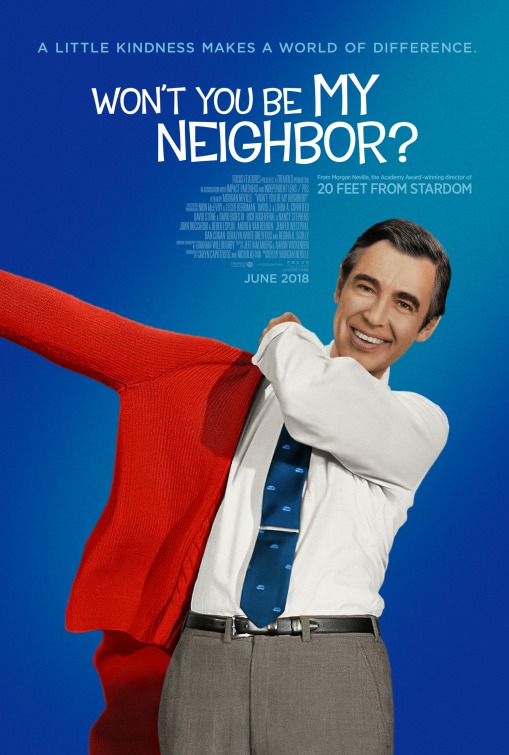
![]() In my pre-school days, I must admit I responded a lot more to the work of Jim Henson (Sesame Street, The Muppet Show) than Fred Rogers. Mister Rogers wasn’t hip or cool or particularly funny. However, he undoubtedly held a sincere, genuine quality that I still find admirable. He was unlike anyone on TV before or since. His placid, composed demeanor was so incongruous to other hosts that he was almost alien. The world of children’s entertainment has often relied on wacky escapades, cartoons, frenetic spectacle and animated hosts to captivate kids. Mister Rogers’ Neighborhood was none of those things.
In my pre-school days, I must admit I responded a lot more to the work of Jim Henson (Sesame Street, The Muppet Show) than Fred Rogers. Mister Rogers wasn’t hip or cool or particularly funny. However, he undoubtedly held a sincere, genuine quality that I still find admirable. He was unlike anyone on TV before or since. His placid, composed demeanor was so incongruous to other hosts that he was almost alien. The world of children’s entertainment has often relied on wacky escapades, cartoons, frenetic spectacle and animated hosts to captivate kids. Mister Rogers’ Neighborhood was none of those things.
Fred Rogers had a serious agenda but would address it in his own uniquely quiet way. He simply wanted to affirm that children are “loved and capable of loving.” He became an ordained minister of the United Presbyterian Church in 1963 but wanted to work in television because he “hated it so” or at least the kinds of “pie-in-the-face” programming popular at the time. Documentarian Morgan Neville (20 Feet from Stardom, Best of Enemies: Buckley vs. Vidal) inserts footage to clarify this point. The decision has a bit of a pompous air as it besmirches stuff like Soupy Sales, Howdy Doody and Bozo the Clown. Fred saw an opportunity to educate young minds in the way he felt they should be spoken to. Neville includes other clips that illustrate a man not easily categorized. Despite being a lifelong Republican, he famously advocated the government funding of children’s television before a U.S. Senate committee during Nixon’s administration.
This documentary celebrates the man, but it also reminds me just how static his program truly was. Every episode beginning with him arriving home, singing “Won’t You Be My Neighbor?” and changing into sneakers and a cardigan sweater. Then he’d discuss a theme for that week where he’d just plainly sit and talk directly to the audience. That theme would later be explored by a trip to the “Neighborhood of Make-Believe” where puppets King Friday XIII, Queen Sara Saturday, X the Owl, Henrietta Pussycat, Daniel Striped Tiger, and Lady Elaine Fairchilde would interact. Mister Rogers didn’t appear in those segments but he’d do the voices. Through it all, he’d softly and calmly address the viewer almost as if you were the only person in the entire world.
Mister Rogers’ Neighborhood had its official debut on February 19, 1968, on NET. After its first three seasons, it would continue to air on its successor PBS, until August 31, 2001. In that time, the world experienced civil unrest, urban violence, assassinations, wars and global tragedies. Morgan Neville builds a case that Fred Rogers was a peaceful revolutionary. “I Like You As You Are” Mister Rogers memorably sang in one of the many songs he wrote for the series. As segregationists demanded swimming pools for whites only, he invited series regular Officer Clemmons (François Clemmons), a black policeman, to join him as he cooled his feet in a kiddie pool on a 1969 broadcast. Clemmons acknowledges he was also gay in one of many talking head interviews recorded for this documentary. François Clemmons recounts that Fred Rogers was aware of this fact, but asked Clemmons to remain closeted for the purposes of the show. The two remained lifelong friends as he continued to appear on the show.
Mister Rogers had a distinctive way of connecting with children. This gifted ability is spectacularly demonstrated on an episode from 1981. He meets with 10-year-old Jeff Erlanger. A quadriplegic, he explains why he uses an electric wheelchair. If their subsequent duet of “It’s You I Like” doesn’t move you, then please check your pulse. The host’s naive sincerity was unparalleled for a person on TV. I can still remember seeing Fred Rogers as an unlikely guest on the very first season of Late Night with David Letterman on NBC. It was February 17, 1982, to be exact. The clip still exists on YouTube. The clashing of these two diametrically opposite personalities was fascinating but also uncomfortable to watch. Within Mr. Letterman’s cynical atmosphere, Mr. Rogers appeared rather peculiar. What a difference context makes. Won’t You Be My Neighbor? is, as expected, a loving tribute. A man whose gentle temperament is presented like an elixir for troubled times. The mission is not to drop any bombshells. No secret life or dark side to this man according to the documentary. He was goodness personified and that’s the uplifting feeling you’ll get when exiting the theater.
07-12-18
Leave a comment